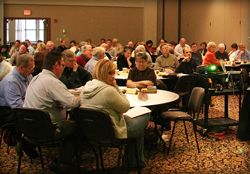Lasting Marriage Means Keeping Our Friendship Alive

To make a relationship last: couples must become better friends, learn to manage conflict, and create ways to support each other’s hopes and dreams.
Marriage Is Being Best Friends

Nothing is better than having a spouse who is both your lover and your best friend.
Friedrich Nietzsche has said, “It is not a lack of love, but a lack of friendship that makes unhappy marriages.” And this couldn’t be more true; after all, the strongest relationships seem to be those that are built on friendship.
Marriage, like any friendship, begins with areas of commonality, but the stresses of normal everyday life – children, work, finances, illness, caring for elderly parents – can tax the relationship and cause it to grow apart. Traditional marriage counseling is one way to deepen your friendship, but you can also engage in some simple practices.
No, this doesn’t necessarily mean that your husband will enjoy going shopping and getting mani/pedis with you or that you have to enjoy watching football in order to be friends with him. What this does mean is that your romantic bond contains many of the wonderful traits that everlasting friendships do.
The two of you share common interests but also know how to discuss and get past your differences. You know what pushes each others’ buttons as well as what makes one another smile.
Just like the greatest friendships, your relationship is full of trust, respect, honest communication, loyalty, adventure, acceptance and unconditional love.
You can tell each other anything—even your deepest desires and dreams. Not only can you share your inner world with each other, make each other laugh, you also know how to cheer each other up during a stressful week or having to handle the ups and downs in life; this includes knowing when to offer an ear to listen when they want to talk or to give space when they don’t. It’s all a balance.
But most of all, you enhance each other’s lives. The laughter you share, the problems you endure and the tears you wipe away not only strengthen your bond, but also give you both motivation to become better and better which will bring you closer and closer.
There’s no question that this kind of love built upon friendship is capable of standing against all odds. It’s the kind of love that could last a lifetime.












1. Play together. There is science behind the adage that “Couples who play together, stay together.” In a series of ingenious experiments, psychologist Art Aron and his colleagues have shown that couples who share exciting, exhilarating activities together—such as going rock climbing or riding roller coasters—experience an increase in their sense of closeness and relationship satisfaction. Not just any activity will do, though; it’s important that couples play in ways that are physically arousing, according to Aron.
2. Crack more jokes. People in many satisfied relationships point to humor as a key to their longevity. Humor benefits both individuals and relationships by helping to relieve stress, defusing tension that might otherwise lead to conflict, and even allowing people to bring up topics that would be difficult to discuss otherwise.
3. Learn to listen. Listening is a skill at which almost all of us overestimate our ability. More than just hearing what another person is saying, listening involves investing the energy to understand and remember another person’s message and then to respond to that message in an appropriate and effective way. That’s tougher than it sounds—but because listening is a skill, it can be improved through practice.
4. Say you love each other more often. This resolution comes from my own lab, where we find that both receiving and expressing messages of affection improves the health of close relationships—as well as the health of the individuals in them. If you’re already an affectionate person, step up your game in the new year…and if you generally shy away from affection, resolve to express affection to someone at least once a day, in a way that feels comfortable to you.
5. Find a faith. Research tells us that couples who are active in a religious faith are more satisfied and more committed to their relationship than couples who are not, irrespective of which religious tradition they follow. If a faith life appeals to you, consider establishing or renewing bonds with a faith community. If religion isn’t for you, consider a commitment to a cause that matters to you, such as rescuing abandoned animals or helping people displaced by natural disasters. The content and focus of your commitment are less important than the fact that you engage your commitment together.
6. Put away the cell phone. Communication technology is a boon for maintaining social relationships, but it can interfere with intimate ones. New research shows that even the presence of a cell phone during a face-to-face conversation—even if it’s never touched—reduces people’s satisfaction with that conversation. It may seem innocuous simply to lay your phone on the table while talking to your partner, but its visible presence can send the message that your attention could be diverted from your partner at any moment.
7. Forgive. For many people, this is undoubtedly the most difficult Relationship Resolution on the list. In close relationships, however, we sometimes hurt each other, whether intentionally or accidentally. Resolve to let go of the hurt that others have caused you. Holding onto disappointments and transgressions only hurts you and your relationship more, so learn to forgive. Forgiveness won’t happen instantaneously when the calendar switches to 2014…but it’s a process you can resolve to begin.
Not all of these Relationship Resolutions will help every person or every relationship, so pick and choose the ones most relevant to you, and add others. In the long run, what you do is probably less important than the fact that you direct energy and attention to your relationship in the first place. Doing so will help you make the new year a happy and prosperous one.